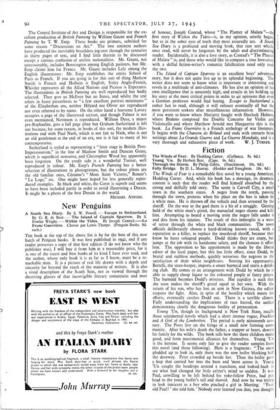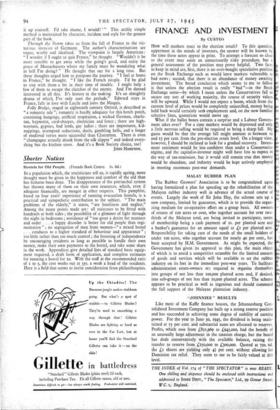Fiction
The Winds of Fear. By Hodding Carter. (Gollancz. 8s. 6d.)
Young 'Un. By Herbert Best. (Cape. 9s. 6d.)
Through the Storm. By Philip Gibbs. (Hutchinson. 10s. 6d.)
Folly Bridge. By D. L. Murray. (Hodder and Stoughton. • 10s. 6d.) The Winds of Fear is a remarkable first novel by a young American, Hodding Carter.. And, while his book has a message, its dramatic content is such that the reader will find himself absorbed by the strong and skilfully told story. The scene is Carvell City, a small town in the southern states. A negro from the north, passing through the town, protests when his place on the bus is taken by a white man. He is thrown off the vehicle and then arrested by the sheriff. On the way to the gaol there is a bit of a struggle. Getting hold of the white man's pistol, the manacled negro shoots and kills him. Attempting to board a moving train the negro falls under it and dies from his injuries. The result of this imbroglio is a wave of terror through the white and black communities. The town officials deliberately choose a hard-drinking known rascal, with a reputation as a killer, to replace the murdered sheriff, because they know he hates coloured people. Dodd thinks they are crazy, but jumps at the job with its handsome salary, and the chances it offers him. The opposition to his appointment is made by the liberal editor of the local paper, but this has little effect, since Dodd, by brutal and ruthless methods, quickly terrorises the negroes to the satisfaction of their white neighbours. Sensing his opportunity, Bertelli, the store-keeper, imports a smart barmaid and starts a drink- ing club. He comes to an arrangement with Dodd by which he is able to supply cheap liquor to the coloured people at fancy prices. The barmaid becomes Dodd's mistress. Her cupidity is such that she soon makes the sheriff's greed equal to her own. With the return of his son, who has lost an arm in New Guinea, the editor reopens the fight. Alan, in spite of the hostility which meets his efforts, eventually catches Dodd out. There is a terrible climax. Fully understanding the implications of race hatred, the author deinonstrates clearly the dangerous futility of persecution. Young 'Un, though its background is New York State, recalls those sentimental novels which had a short intense vogue, Freckles and A Girl of the Limberlost. The period is early nineteenth cen- tury. The Posts live on the fringe of a small new farming com- munity. After his wife's death the father, a trapper at heart, deserts his family for the wilds. The book tells how the three children make good, and form matrimonial alliances for themselves. Young 'Un is the heroine. It seems only fair to give the reader samples from this novel (and those following). Here is a fragment : " The oxen plodded up to look in, only there was the new heifer blt;cking half the doorway. Peter crowded up beside her. Then the heifer gave a leap that carried her into the barn and 'most across it. -Young 'Un caught the headrope around a stanchion, and looked- back to see what had changed the little critter's mind so sudden. It was Paul, unwilling to be left behind his yoke-fellow Peter, had put heed to the young heifer's tail and shoved. And now he was trying to look innocent as a boy who pinched a girl in Meeting. !Your old Paul! ' she told him. Nobody eyer learned you that, you thought
it up yourself. I'd take shame, I would! ' " This archly simple method is maintained by character, incident and style for the greater part of the book. Through the Storm takes us from the fall of France to the vic- torious invasion of Germany. The author's characterisations are vague, woolly and idealised. The viewpoint is largely American: " I wonder if I ought to quit France," he thought. " Wouldn't it be more sensible to get away while the going's good, and enjoy the peace of Massachusetts where my family must be wondering what in hell I'm doing? " He thought that out for a long time. But these thoughts urged him to postpone the journey. " I feel at home in France," he thought. " I like the French people. I'd be glad to stay with them a bit in their time of trouble. I might help a few of them to escape the clutches of the enemy. And I'm darned interested in all this. It's history in the making. It's an almightly drama of which. I've only seen the prelude." Edward stays in France, falls in love with Lucile and joins the Maquis.
Folly Bridge, staged in eighteenth century Oxford, is described as "a romantic tale "; romantic is hardly adequate for this hotch potch, containing hangings, artificial respiration, a wicked German, charla- tan, hypnotist, card-sharper, electrician and fence ; there are high- waymen, gypsies, bad lords, gay ladies ; there are impostures, k:c1- nappings, attempted seductions, duels, gambling hells, and a forger of medieval verses more successful than Chatterton. There is even " champagne actually drunk from the silk slipper " and indeed every- thing but the kitchen stove. And it's a Book Society choice, too! JOHN HAMPSON.



























 Previous page
Previous page